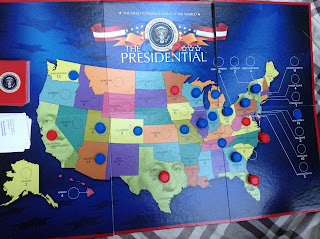The Play
Each team has 150 "votes" (chips) to be placed on the states where they have the majority. Play is governed by chance (The roll of the dice, and draw of "politics cards"), and strategy (Whether to "campaign" or "fundraise," and which states to focus on in each activity). |
| Getting ready for the game... |
The first strategy decision, as I mentioned is whether to campaign or fundraise.
Fundraising can only happen in one of the big 4, California, Texas, Florida, and New York. If your players have the habit of forgetting, those 4 states have a "Currency" background as a reminder (nice touch!).
Now chance comes in to play, as the number of votes "won" during fundraising (or campaigning) all rest on the roll of the dice. Fundraisers must put 1/2 of the votes earned (from all three dice totaled) on the state where they did the fundraising, and the other votes can be placed on any other state, in any combination. After fundraising, another element of chance AND strategy enters, as the player draws a "politics card."
These cards have things on them like
"Your campaign plane gets grounded during a snowstorm in Montana. The local news interviews you live at the Billings Holiday Inn. Add 2 votes to Montana." or
"Your opponent's spouse is overheard telling a campaign worker that he/she can't stand seafood. Add 2 votes to Maine and 2 votes to Rhode Island"
These cards can be used at the end of your turn, or saved to be used later, after a "Campaign" turn, when politics cards are NOT drawn (part of the "strategy" involved).
 |
| Game board after a few "weeks" of play |
Campaigning can happen in any state. When campaigning the player chooses 3 states to campaign in on that turn. The dice are rolled. The player then chooses which die to allocate to which state, and places the corresponding number of chips on the state. There are other specifics to play, which are more easily explained in the directions, which can be downloaded from the FAQ page.
The game comes with scoresheets, which we found to be a little confusing. Another option is to simply add and subtract EC votes as states are won and lost, using a blank piece of paper... :)
There is also an online option, the webmap calculator (Which certainly makes "keeping score" simpler, and I highly recommend it!). The screenshot to the left is from the webmap calculator at the end of the below photographed game~ interestingly enough it was just about the exact opposite of what the states would show in real life!
The instructions suggest that a "30 week" game should take about an hour, but we found that to be rather optimistic. We found that we could only get through 13-16 weeks in an hour. Thus it has been decided that we would play for a set period of time, regardless of the number of weeks.
When you do reach the end of your agreed upon weeks (or time in our case), the states that are still neutral are decided by the roll of one die per team/state, with the highest roll winning the state.
Eldest said "I understand the Electoral College better now, but I think it is utterly ridiculous! It makes sense to me now how the states can go back and forth during a campaign, and why the big states like California are such a major focus, but in the long run, it isn't necessary to win all the big states in order to win the election (however, it does make it easier). Playing this game was stressful for me, and I don't want to ever even contemplate going into politics."
Middlest thought that the game was interesting. He learned that each state has a certain number of votes, and whichever party has the most votes in the state gets all of the EC votes, even if it is really close, with just a little over 1/2 the popular vote. He decided that "the majority rules" per state is not the fairest system, and that he would prefer to see the election run by popular vote. Unlike his sister, he didn't find the game stressful at all, and thought it was fun to play.
I found it interesting that my eldest was "Stressed" by the game, but it made sense~ while competitive by nature, she doesn't like to play a game that doesn't seem to be entirely ruled by common sense. I tend to agree with both of my children, in that this game definitely reinforced my opinion that the Electoral College is a somewhat flawed system.
I do want to make sure that it is understood that the GAME is not flawed, and is in fact a GREAT strategy game for those who enjoy that sort of political play (like myself, and apparently my middlest!). Keeping score was definitely a little confusing to start out with.
I just had a brainstorm while writing this review, so haven't had the opportunity to try it out, but think it might work well for someone with younger players~ removing one element of strategy. One could skip "keeping score" and just use the chips to keep track of the moving of votes. At the end of the game you could count the scores to see who really won. I think the kids would be surprised, based on how much color they see on the board... :)
Not So Nutty Nitty Gritty
A fun way to teach kids the power as well as the puzzling nature of the Electoral College.
- Company: The Presidential Game
- Ages: 11+
- Price: $35
Blessings~




No comments:
Post a Comment
Thanks so much for letting me know you were here. I appreciate "thoughtful" comments. :)